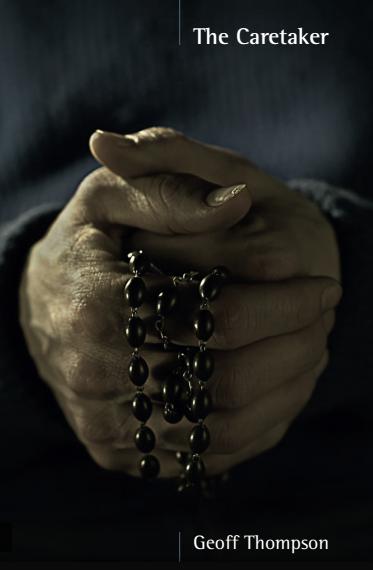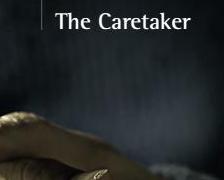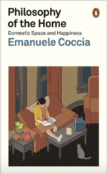[dropcap style=”font-size:100px; color:#992211;”]T[/dropcap]he Caretaker is an ambitious tome by BAFTA-winning author/screenwriter Geoff Thompson, which attempts to document a personal, if familiar, worldview.
Familiar, in that the tenets of faith and philosophy delineated through the book’s narrative are the stuff of fuzzy platitudes, vague wisdom and motivational quatations. Which is not to say that they are as shallow or easily dismissed as the popquotes distributed by social media neophytes, but that in his attepmpt to express the universal, Thompson slips into a mode of writing which recalls Lao Tzu’s Tao Teh Ching, Confucian translations or gospel verses. 
Split into chapters with self-explanatory titles (‘Greed’, ‘Know Thyself’) interspersed with self-immolating passages of prayer, although the style of prose is less overtly didactic than the longer chapters of the Abrahamic tradition, a similar extrapolation of wisdom from seemingly humble subjects for spiritual metaphor (The Cow, or The Rock, from the Koran, for example) is used.
Were it not for occasional cultural references or linguistic signposts, The Caretaker could indeed be mistaken for an established liturgical text. ‘Coat tail capitalist’ and ‘the elusive Godot’ are the first indications (in the second chapter) that the text is contemporary – that the observations are those of a single writer and not the accumulated, codified and edited mythos of an entire culture. A convincing piece of literary ventriloquism then, with a convincing mimicry of the form that befits Thompson’s status as author of over forty books and copious sundry writings.
Stephen Russell’s cult hit Barefoot Doctor’s Handbook for the Urban Warrior introduced the term ‘spiritual slut’ into common parlance as long ago as 1998. In it, Russell advised a footloose approach to the world’s belief systems, parsing their component parts as individual cultures’ expressions of the same universal Truths, and thereby justifying a pick and choose mentality in drawing spiritual benefit from them. Why not, Russell argued, take the interpersonal ethics of Buddhism along with the forgiveness motif of Christianity as guiding principles, whilst simultaneously rejecting the nasty old spoilsport stuff like vows of poverty or pre-marital sex bans?
The answer, in a nutshell, could have come from the Karate Kid‘s Mr Miyagi: Wax on, Wax off. Thompson, himself an outrageously accomplished martial artist (8th Dan), cannot be accused of spiritual sluttery. Certainly, he draws from various theologies (mention is made of Immams, of the Torah, as well as scattered references to various faiths) and invokes ‘Lord, God Almighty, the Universe’ in the opening line. That said, a shallow dip into only the feelgood prayers and practices of established theologies forms no part of Thompson’s epistomology.
Instead (and it is difficult not to envision the mountain-running, raft-straddling training montages of martial arts feature films at this point), Thompson preaches the hard road of self-immolation and selflessness.
With a circular narrative starting from the viewpoint of one who has attained enlightenment, oneness with the universe, we are taken through the story of an unnamed man’s progress through life. The vices of arrogance, greed, impatience (for starters) are examined. The underlying themes – that over-concentration on the material comforts weakens the individual’s ability to connect with that which is truly spirit-sustaining; that the ego can strike hardest when manifesting as virtue; that humans have an inordinate capacity to convince themselves that their actions are to their own benefit even when they are patently not, are reinforced throughout the progress, slipbacks, and eventual enlightenment of the protagonist.
The prayers/incantations/addresses between chapters are given from the viewpoint of one who has attained the wisdom promised in the text. This, more or less, is the realisation that even the most enlightened’s prayers and desires stem from an impatient ego. Almighty, the wise one asks, when I tell you I am ready for further knowledge, do not give it to me, for if I am truly ready, why would I need to say so? Or, When I ask for clemency, give me the north winds – for if it was the making of the Vikings, so will it be the making of me.
Catholicism would put it thus: ‘Lord, I am not worthy to receive you’.
In what is the central parable – concerning the analogy-ready properties of an oak tree, Thompson comes closest to laying out the workings of his worldview. In evoking the stoic, patient qualities of the long-lived tree (citing its economy of effort, the inter-related action of roots, leaves, trunk, and branches) the phrase: ‘service is a powerful purpose. With it, the whole universe conspires in your favour’ arises.
That the protagonist misunderstands the parable and burns himself out in his efforts to heal the world is cautionary. It is also critical to the narrative, in that is allows the recurring concept ‘the Way is local’ to be raised. Change yourself, the wise advise, and the world will change to fit.
Which, Crowley devotees will point out, is an ethos that owes as much to physics as metaphysics. A William Bateson/ Richard Dawkins/Nils Bohr reading of quantum entanglement suggests that it is not the mere matter of the universe which gives us our existence, but the information which directs those clustered atoms to coalesce as they do.
Given that current scientific thinking presumes an infinity of parallel universes which arise from each of our actions/inactions, there may well be a way to navigate between those universes at will. Trancendentalists claim this ability through meditation, magicians through directed gnosis, and perhaps Thompson’s central tenet : that through the application of stoic self-discipline, awareness, and the rejection of the comfortable easy-access sops of western capitalist society, ‘with purpose….the whole universe conspires in your favour’, has a wisdom rare in a work by an individual.
The Caretaker is certainly a calming and thought-provoking read, albeit difficult to thoroughly paraphrase in a review. Perhaps, at the special offer price of £275 for a 90-minute walk with Thompson, the author may be able to demonstrate the virtues of non-materiality, wisdom and the barrenness of greed in person.
Published by Geoff Thompson Ltd. To be released in June 2014

An observer first and foremost, Sean Keenan takes what he sees and forges words from the pictures. Media, critique, exuberant analysis and occasional remorse.





















